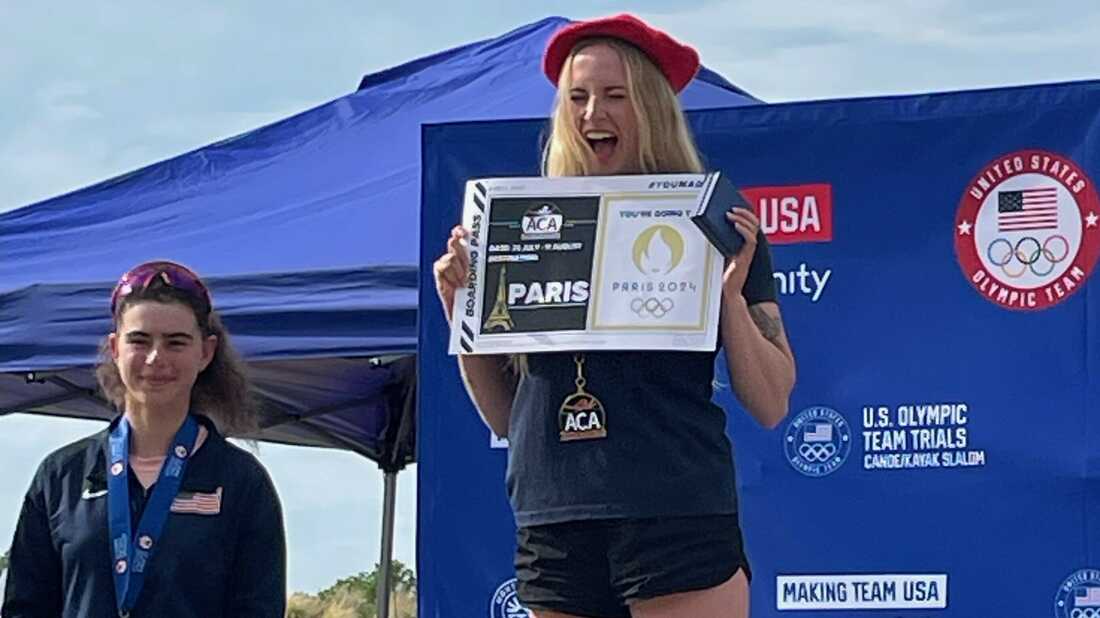Sports
Alabama holds its first ever U.S. Olympic trial for a little-known sport
At the U.S. Olympic trials in Montgomery, Evy Leibfarth wins a spot to represent USA in women’s canoe slalom for the 2024 Paris Olympics this summer.
Rolando Arrieta/NPR
hide caption
toggle caption
Rolando Arrieta/NPR
At the U.S. Olympic trials in Montgomery, Evy Leibfarth wins a spot to represent USA in women’s canoe slalom for the 2024 Paris Olympics this summer.
Rolando Arrieta/NPR
MONTGOMERY, Ala. — Tammy Sterling had plans to go out of town this past weekend. Instead, she stayed home to attend an athletic event she’d never seen before.
“I am actually watching the Olympic trials, and I’m going to see somebody that I watched today at the Paris Olympics in 2024. It’s just amazing. I love it,” Sterling said.
The U.S. Olympic Team trials for canoe and kayak slalom were held Saturday and Sunday at Montgomery Whitewater, a new artificial watersports complex near downtown Montgomery. Hundreds of curious Alabamians turned out for the event.
Cindy Riggins was intrigued by the caliber of athletes who had traveled to her hometown for this competition.
“It looks like a fun sport. Looks very tiring — you have to definitely be in shape,” she said.
In canoe and kayak slalom, athletes race against the clock navigating through a series of red and green gates hanging above raging rapids. Points are deducted if they touch or miss any of the gates. Coaches, teammates, friends and parents ran alongside the course, encouraging and cheering the racer down to the finish line.
“They chant: up up up!” said kayaker Nik Nijhawan. “That’s because the red gates are also called up gates so it’s our own variation of, go go go,” Nijhawan said.
Nijhawan, 16, is from Colorado and said he does not expect to make the Olympic team this year — “but sometime in the next 10 years it would be amazing.”
Evy Leibfarth, 20, from Bryson City, N.C., had the fastest time in both kayak and canoe slalom events and was the only athlete among the nearly 70 who competed in Montgomery to secure an Olympic spot in the women’s canoe slalom. The remaining spots for Team USA will be determined in Oklahoma City in two weeks.
Evy Leibfarth of the United States competes in July 2021 in the Women’s C1 of the Canoe Slalom at the 2020 Summer Olympics in Tokyo.
Kirsty Wigglesworth/AP
hide caption
toggle caption
Kirsty Wigglesworth/AP
Evy Leibfarth of the United States competes in July 2021 in the Women’s C1 of the Canoe Slalom at the 2020 Summer Olympics in Tokyo.
Kirsty Wigglesworth/AP
“This weekend has been amazing for me. I’m really proud of my racing this weekend. Overall it’s been great, emotional and so much fun.” said Leibfarth, who’ll be competing in her second Olympics after finishing outside the top 10 in two events in Tokyo in 2020.
“It’s been a dream of mine to go to Paris for a really long time and I’m really stoked to make that a reality,” Leibfarth added.
Boosting the city’s athletic profile
Local leaders hope an Olympic-sanctioned event like this will help the Montgomery economy and put the city on the map as a sports tourism destination.
Mayor Steven L. Reed said that hosting the U.S. Olympic trials speaks to “a pivot we want to make, to make sure that sports tourism is also a big part of what’s happening here.”
He said he sees a kayaking and canoeing competition of this level as a way to break down racial, economic and social barriers, particularly among kids. “Maybe they can be the first one from Montgomery or maybe one of the first ones from Alabama to bring home a medal” in these events, the mayor said.
Montgomery Whitewater was built by the county for about $90 million and opened in July. It’s the third artificial whitewater park in the U.S., joining facilities in Oklahoma City and Charlotte. It’s part of a broader shift in the sport, with almost all high-level competitions now held on artificial courses.
Three-time kayak slalom Olympian Scott Shipley, who is now a mechanical engineer, designed all three whitewater parks.
“It was something I wanted to bring to America,” Shipley said. “It’s a whole recreational thing where it’s not just that 1%, but also church groups and school groups and family and friends coming out to enjoy whitewater where they are.”
Bringing broader visibility to paddle sports
Jedediah Hinkley, competition director for the American Canoe Association, made a half-dozen trips to the venue to make sure it was ready for the Olympic trials. He said his group and Montgomery share a goal of “creating access to a sport that a lot of people around here have not historically had access to.”
Even with the new venue, not everyone in Montgomery is ready to pick up a paddle. Nick Riggins, who watched the events with his sister Cindy, said that when he first heard about the city investing in a whitewater park near downtown he “thought it was a hoax.”
“It’s interesting to watch to see how they maneuver with the kayaks and all that other kind of stuff, but not anything that I would want to do,” Riggins said. “There’s a lot of water moving real fast and I don’t want to do that.”
Still, he said, he was glad the facility was open.
